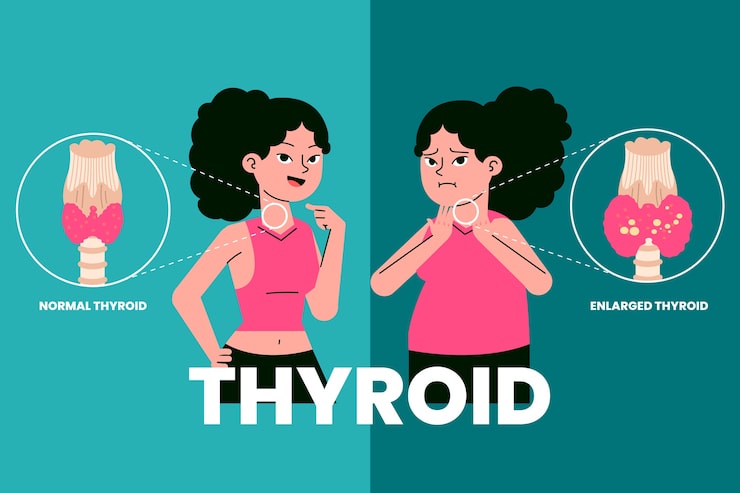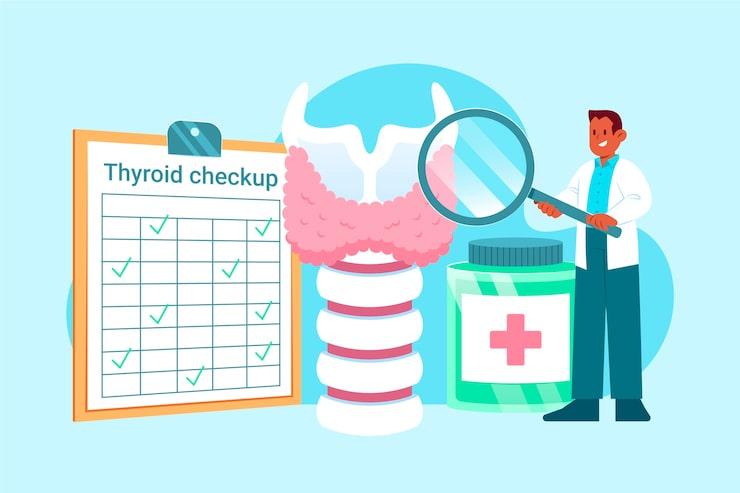Living with thyroid problems: Tips for making life easier every day

Woman holding a model of thyroid over her throat
The thyroid is a little, butterfly-shaped gland at the base of your neck that controls your metabolism, energy levels, and general health. When it doesn't work right, it can have an effect on all of your body's systems. Thyroid problems are frequent and can last a long time. They include hypothyroidism (underactive thyroid) and hyperthyroidism (overactive thyroid). It might be hard to live with a thyroid problem, but you can control your symptoms and live a healthy, balanced life if you have the correct information, daily routines, and lifestyle choices.
Before we get into the advice, it's crucial to know about the two most prevalent thyroid problems:
This happens when the thyroid gland doesn't make enough thyroid hormones. It slows down your body's metabolism, which can cause:
An overactive thyroid makes too much hormone, which causes this. It can make you:
Both disorders need to be correctly diagnosed and treated by a doctor, which usually means hormone replacement or suppression therapy. But lifestyle is just as important as medicine for controlling symptoms and making life better.

photo of a healthy v/s enlarged thyroid
1. Take your medicine at the same time every day.
If you take thyroid medicine, such levothyroxine for hypothyroidism, you need to take it at the same time every day.
Take it at the same time every day, ideally in the morning on an empty stomach. Do not eat or drink anything (except than water) for at least 30 to 60 minutes after taking it. Be careful that calcium, iron supplements, and some foods (such soy or meals heavy in fiber) can make it harder for your body to absorb nutrients. Take those at a different time of day. Making a schedule for taking your medications helps keep your hormones in balance and your symptoms under control.
2. Follow a diet that is good for your thyroid.
What you eat can affect how well your thyroid works and how well your body absorbs medicine.
Pay attention to:
Whole foods : fruits, vegetables, lean proteins, and whole grains. Foods high in selenium, like Brazil nuts, sunflower seeds, and eggs, help keep the thyroid healthy.
Iodine: Important for making hormones (found in iodized salt, dairy, and seaweed). But too much iodine can make some thyroid problems worse, so moderation is important.
Zinc and Iron: These minerals are in beans, leafy vegetables, and lean meats. Important for making hormones.
Avoid or limit:
Soy: It might make it harder for your body to absorb thyroid hormones. It's okay to take it in moderation, but don't do it close to when you take your medicine.
Cruciferous vegetables : Eating a lot of them raw can mess up how your thyroid works. This effect is lessened when you cook them.
Highly processed foods: These can make symptoms like weight gain, tiredness, and stomach problems worse. To make a personalized food plan, think about working with a dietitian who knows about thyroid problems.
3. Put Sleep and Rest First
Thyroid issues, especially hypothyroidism, can make you very tired. It's really important to get enough sleep.
Set a regular sleep pattern and try to get 7 to 9 hours of sleep each night.
Make a nightly regimen that includes less screen time, dimming the lights, and relaxing before bed. If you can't sleep because of hyperthyroidism, relaxing beverages like chamomile or guided meditations can assist.
Talk to your doctor if you still feel tired after getting enough sleep. You might need to change your medicine.
4. Control Your Stress Levels
Stress can make thyroid symptoms worse, especially in autoimmune thyroid illnesses like Hashimoto's or Graves' disease.
Meditate and be mindful, to relax your thoughts and lower your stress.
Add yoga or tai chi to your routine. These are gentle workouts that also lower stress hormones.
If you feel overwhelmed, try deep breathing techniques. Put self-care, free time, and social support at the top of your list. It's not just emotional to deal with chronic stress; it's also physical. It can cause flare-ups and affect your entire health.
5. Stay active, but pay attention to your body.
Exercise can help with thyroid problems that influence energy, mood, metabolism, and weight. * If you have hypothyroidism, low-impact activities like walking, swimming, and strength training can help you lose weight and get more energy.
For hyperthyroidism, don't do workouts that are too hard because they could make your metabolism work too rapidly.
Take it easy and stick with it. If you're tired or your muscles are weak, pushing too hard can backfire. If you feel really exhausted, dizzy, or sick during or after exercise, cut back and talk to your doctor.
6. Keep an eye on your symptoms and note any changes.
Keeping a journal of your symptoms might be a great way to take care of your thyroid health. Keep track of factors like mood, energy levels, sleep quality, weight fluctuations, and how sensitive you are to temperature.
Keep track of when you take your medicine, what you eat, and how much you move. During checks, give your doctor your notes so they can change your treatment plan if necessary. There are other apps that can help you keep track of your thyroid and see how it changes over time.
7. Get blood work and checkups on a regular basis.
Thyroid hormone levels change and need to be watched all the time. Every 6 to 12 months, or more often if your symptoms change, work with your doctor to check your TSH, T3, T4, and possibly thyroid antibodies. Never vary your dose on your own, even small modifications might have a huge effect. Talk frankly about any new or worsening symptoms. Taking care of your health ahead of time can help avoid problems in the future.
8. Talk about mental health
People with thyroid problems often have anxiety, despair, and cognitive fog, but these symptoms can sometimes be ignored or misinterpreted.
Don't disregard emotional or cognitive symptoms, they are real and have to do with your illness. Find a therapist who knows a lot about chronic disease or hormone abnormalities. Support groups, whether they are online or in person, can also help you feel better, give you advice, and connect with others. Brain fog may get better with the right treatment and changes to your lifestyle, but it's still helpful to get mental health assistance while you do it.
9. Keep learning and staying up to date
Even doctors often don't understand thyroid problems. The more you know about your situation, the better you can fight for yourself.
Check out trustworthy sites like the American Thyroid Association (thyroid.org) and the British Thyroid Foundation (btf-thyroid.org).
Join online groups or forums that are particular to thyroid issues, but always check with your doctor before following any advice.
Don't be afraid to get a second opinion if you need one.
Ask questions during your appointments. Knowing more about your care offers you the power to make smarter choices.
10. Change your life instead of fighting it.
If you have a chronic ailment, you need to change your expectations and routines.
Plan your day around when you have the greatest energy: Do important things when you feel most awake.
Be kind to yourself on days when you don't have much energy: Rest is part of recovery. When you need help, don't be afraid to ask family, friends, or coworkers.
Celebrate tiny wins, like getting a good night's sleep or going for a productive walk. It's not about giving up; it's about being strong and flexible.

Illustration of a doctor with Thyroid model and medicine
If you see any of the following, you should call your doctor:
It can be hard to live with a thyroid problem, but it's possible to do so with the correct tools, support, and attitude. Taking your medicine on time, eating well, dealing with stress, and getting enough sleep are all tiny things you can do every day that make a significant difference. The thyroid path is different for everyone. Give yourself time, stay up to date, and make choices that are good for your health instead of bad for it. You can not only survive with a thyroid problem, but also thrive if you are aware and take care of yourself. For any queries, follow up with the talented doctors at Prakash Hospital, Greater Noida.
We offer expert care across key specialties, including Medicine, Cardiology, Orthopaedics, ENT, Gynaecology, and more—delivering trusted treatment under one roof.

Dr. Megha
Prakash Hospital Pvt. Ltd. is a 100 bedded NABH NABL accredited multispecialty hospital along with a center of trauma and orthopedics. We are in the service of society since 2001.
OUR SPECIALITIES
Contact Us
D – 12A, 12B, Sector-33, G. B. Nagar, Noida, Uttar Pradesh 201301
+91-8826000033

© 2026 All rights reserved.
Designed and Developed by Zarle Infotech